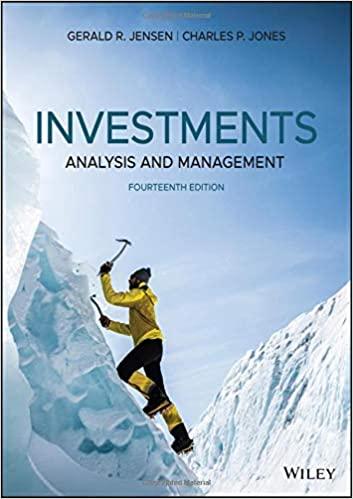Question
13 01:58:02 eBook financial state Statement of Financial Position Cash Accounts receivable (net) Inventory Property, plant, and equipment (net) Other non-current assets Total assets Current
13 01:58:02 eBook financial state Statement of Financial Position Cash Accounts receivable (net) Inventory Property, plant, and equipment (net) Other non-current assets Total assets Current liabilities Long-term debt (10%) Share capital for Armstrong and Blair companies for the current year are summarized below. Contributed surplus Retained earnings Total liabilities and shareholders' equity Statement of Earnings Sales revenue (1/3 on credit) Cost of sales Expenses (including interest and income tax) Net earnings Accounts receivable (net) Inventory Long-term debt Other data: Share price year-end Income tax rate Dividends declared and paid Shares outstanding $ Armstrong Company Selected data from the financial statements for the previous year follows: 18 30% $36,000 15,000 $ 35,000 40,000 100,000 140,000 85,000 $400,000 $ 100,000 $50,000 60,000 150,000 30,000 60,000 $ 400,000 $ 450,000 $20,000 $ 40,000 92,000 48,000 60,000 70,000 (245,000) (160,000) $ 45,000 $ 15 30% Blair Company $150,000 50,000 $ 22,000 30,000 40,000 400,000

308,000 $800,000 70,000 500,000 110,000 70,000 $ 800,000 $ 810,000 (405,000) (315,000) $ 90,000 The companies are in the same line of business and are direct competitors in a large


metropolitan area. Both have been in business approximately ten years, and each has had steady growth. The management of each has a different viewpoint in many respects. Blair Company is more conservative, and as its president said, "We avoid what we consider to be undue risk. Neither company is publicly held. Armstrong Company has an annual audit by an independent auditor, but Blair Company does not.
Comproximately ten years, and each has had steady growth. The manage consider to be undue risk." Neither company is publicly held. Armstrong Company has an annual audit by an independent auditor, but Blair Company does not. Required: 1. Complete a schedule that reflects a ratio analysis of each company. Use ending bolances if average bolances are not ovailable. (Round intermediate calculations and final answers to 2 decimal places.) HINT. To calculate Current Ratio, vou will need to first calculate the total Current Assets. The financial statements for Armstrong and Blair companies for the current year are summarized below: Selected data from the financial statements for the previous year follows: The companies are in the same line of business and are direct competitors in a large metropolitan area. Both have been in business approximately ten years, and each has had steady growth. The management of each has a different viewpoint in many respects. Blair Company is more conservative, and as its president said, "We avoid what we consider to be undue risk." Neither company is publicly held. Armstrona Companv has an annual audit bv an independent auditor, but Blair Combanv does not. 1. Complete a schedule that reflects a ratio analysis of each company. Use ending balonces if average bolances are not available. (Round intermediate calculations and final answers to 2 decimal places.) HINT: To calculate Current Ratio, you will need to first calculate the total Current AssetsStep by Step Solution
There are 3 Steps involved in it
Step: 1

Get Instant Access to Expert-Tailored Solutions
See step-by-step solutions with expert insights and AI powered tools for academic success
Step: 2

Step: 3

Ace Your Homework with AI
Get the answers you need in no time with our AI-driven, step-by-step assistance
Get Started


